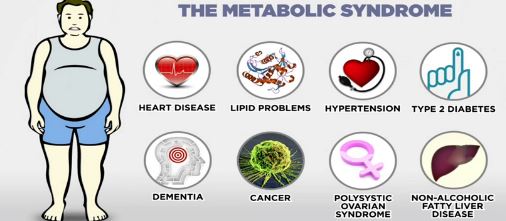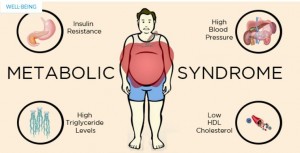You may have never heard of the “Metabolic Syndrome” but it is now considered to be one of the main causes behind early death and many modern chronic conditions such as Diabetes, High Blood pressure or High Cholesterol levels, as pointed for example by the International Diabetes Federation. These conditions form a significant part of the cost of healthcare in the modern world. We are now seeing these conditions reach epidemic levels in the Western world, and the developing world is catching up fast.
I have written several articles about Diet, Metabolic Syndrome and how these can relate to severe chronic conditions. Metabolic Syndrome is a medical term, which describes an underlying disorder of energy utilisation and storage. In short, the body is not able to produce and store the energy derived from food efficiently. The two main elements behind the Metabolic Syndrome are an inability for the body to control cholesterol and respond or maintain insulin levels. This is why it is also termed sometimes “pre-diabetes” or “insulin-resistance syndrome”.

Metabolic Syndrome Definition
Different definitions have been proposed for the metabolic syndrome, but recently the International Diabetes Federation (IDF) and other health institutes have proposed the following definition:
– Central obesity must be present: this is defined as a waist circumference of over 94 cm in men and 80 cm in women. Central obesity can also be assumed for patients with a Body Mass Index (BMI) of over 30.
– One or more of the following factors must also be present:
1) blood triglyceride levels higher than 150 mg/dl or the administration of treatment for high triglyceride levels.
2) a concentration of HDL cholesterol smaller than 40 mg/dl for men and smaller than 50 mg/dl in women.
3) glycaemia levels of more than 1.0 g/l or the administration of treatment for diabetes.
4) systolic blood pressure of more than 130 mmHG and/or diastolic blood pressure of more than 85 mmHG or the administration of treatment for high blood pressure.
Metabolic Syndrome, Weight and Diet
Approximately 20 to 25 % of the world’s adult population is at risk of developing metabolic syndrome. Patients who suffer from Metabolic Syndrome are three times as likely to have a heart attack or stroke compared with people without the syndrome. They are also five times more likely of developing type 2 diabetes. The Metabolic syndrome is now considered to be the driving force for a new cardiovascular disease epidemic (see my article in the International Journal of Contemporary and Alternative Medicine for more information).
Obesity, which is one of the criteria of metabolic syndrome is also a significant element of poor health and death. For example, there is an increase of 18% of mortality risks for people with a BMI over 30.
The drastic changes in the Western modern diet, with a complete imbalance in the ratio of carbohydrate and fat in relation to proteins has been one of the primary factors behind poor energy utilisation and insulin resistance. By following an intelligent and varied diet however, the Metabolic Syndrome can be fully reversed, giving a firm base to a healthier life.
Organising a lifestyle that helps your body to process and store energy efficiently is not taxing. It is about understanding the role of food and good habits. You can still enjoy occasionally a cake or some wine occasionally, but if your nutritional base is correct most of the time, then your body will thank you a million, with more vitality, more energy and less episodes of illness.
I mainly use a programme called Metabolic Balance, which uses blood tests and body metrics to set up an individualised food plan, which becomes more relaxed when your knowledge about food and your weight improve.
Thierry’s Work on Diet and Metabolic Syndrome
You can find several articles from Thierry Clerc published in leading health magazines, and also a report from the International Diabetes Federation highlighting the issues with Metabolic Syndrome here:
– International Journal of Complementary and Alternative Medicine: Metabolic Syndrome
– Case Study: Management of Diabetes with Metabolic Balance
– Complete Health Article on Diabetes
Reference:
Reference 1: Behavio ural Study – Impact of the Metabolic Balance programme on Metabolic Syndrome
ural Study – Impact of the Metabolic Balance programme on Metabolic Syndrome
Reference 2: International Diabetes Foundation Document on Metabolic Syndrome
If you want to address the main foundation of good health, which is proper diet and lifestyle, and reduce the risks from Metabolic Syndrome or want to know more about Metabolic Balance, please email me and I will try and see if I can help you.

